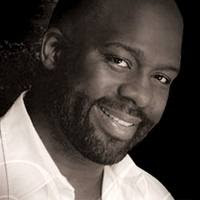A mythic love story set in Trinidad, Ayanna Lloyd Banwo's radiant debut introduces two
unforgettable outsiders brought together by their connection with the dead.
 |
| Publication Date: March 15, 2022 |
Genre: Literary Fiction, Fantasy, Magical Realism
In the old house on a hill, where the city meets the rainforest, Yejide’s mother is dying. She is leaving behind a legacy that now passes to Yejide: one St Bernard woman in every generation has the power to shepherd the city’s souls into the afterlife. But after years of suffering her mother’s neglect and bitterness, Yejide is looking for a way out.
Raised in the countryside by a devout Rastafarian mother, Darwin has always abided by the religious commandment not to interact with death. He has never been to a funeral, much less seen a dead body. But when the only job he can find is grave digging, he must betray the life his mother built for him in order to provide for them both. Newly shorn of his dreadlocks and his past, and determined to prove himself, Darwin finds himself adrift in a city electric with possibility and danger.
Yejide and Darwin will meet inside the gates of Fidelis, an ancient and sprawling cemetery, where the dead lie uneasy in their graves and a reckoning with fate beckons them both. A masterwork of lush imagination and exuberant storytelling, When We Were Birds is a spellbinding and hopeful novel about inheritance, loss, and love's seismic power to heal.
About the Author:
"I believe in ghosts like some people believe in God"
Ayanna Lloyd Banwo, 41, emerged from the University of East
Anglia’s MA in creative writing with a manuscript for When We
Were Birds, her masterly debut novel. It announces an important
new voice in fiction, at once grounded and mythic in its scope
and carried by an incantatory prose style that recalls Arundhati
Roy’s hugely impactful debut, The God of Small Things (1997),
which Lloyd Banwo cites as a major influence.
Born and raised in Port of Spain, Trinidad, she also sees her
work within a tradition of female Caribbean writers including
Olive Senior, Jamaica Kincaid and Lorna Goodison, but says the
biggest influence on her writing was the oral storytelling of women in her own household: “My grandmother told stories like it was breath.” Following the deaths of her mother, her father and her grandmother in Trinidad, Lloyd Banwo moved to the UK five years ago and lives in Battersea, south London. Her writing draws on grief, but Lloyd Banwo’s literary gift lies in her capacity to transfigure that emotion – to conjure a cosmic landscape where the living coexist among the dead. When We Were Birds is both a love story and a ghost story – the tale of a down-on-his-luck gravedigger and a woman descended from corbeau, the black birds that fly east at sunset, taking with them the souls of the dead. (Jan. 16, 2022, The Observer/Fiction, The Guardian)
 |
| UK Edition |
My Review:
I received the ARC (Advanced Reading Copy) from Goodreads Giveaway and Knopf Doubleday Publishing for an honest review.The cover art attracted me to this debut novel. The dealings of a cemetery, its rituals and customs was an interesting appeal to the story. Darwin, whom found employment in a cemetery piqued my curiosity. The dialect of the region and culture was a little hard to follow. I had to re-read sentences or paragraphs several times to get a clearer understanding.
The dealings of a cemetery, it’s rituals and customs was an interesting appeal to the story. Darwin, whom found employment in a cemetery piqued my curiosity. Darwin and Yejide’s world is not my world. The dialect of the region and culture was a little hard to follow. I had to re-read sentences or paragraphs several times to get a sense of what the author was conveying to get a clearer understanding. I enjoyed the chapters with Darwin and was confused on the Yejide’s chapters. However, as the story unfolded around chapter 20 and the mystery starts to unfold, I became totally immersed in the story and read at a faster pace. Now, the characters working with Darwin shedded their skin revealing who they really are.The author told an awesome story, even though it was a bit of a bumpy ride getting there.
The symbolism that is portrayed within the story is instrumental to the messages the author is striving to convey, showing religion versus spirituality and spirits versus the living. The birds (Corbeaux) circling over the city and in a storm, trees, rain, birds that appear after the rain stops. Darwins' dreadlocks in comparison to the Bible verses and passages of how Samsom slew the Philistines and David and Goliath with a slingshot. The characters stayed with me after I finished the novel, which is any authors goal. Darwin was my favorite character because of his strength to care, and his love for his mother as he faced the challenges and evolved into a better man.
There is a passage in the book where Darwin is reflecting, and it says 'Enid used to tell him a story when he was small, bout how long time it had some Africans who coulda fly. That some of them fly all the way back home to Africa too and leave the plantation behind.' This reminded me of the book, The People Could Fly: American Black Folktales told by Virginia Hamilton. As a fantasy tale of the slaves who possessed the ancient magic words that enabled them to literally fly away to freedom was parallel to the authors mythical folktales in the tale of the spirits within the house of Morne Marie and Fidelis Cemetery in Port Angeles. The cemetery connects the two main characters in such a dramatic encounter.








Comments